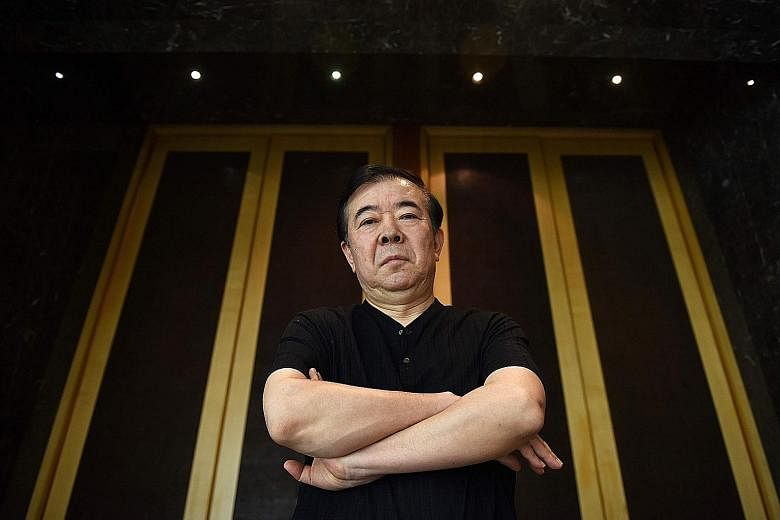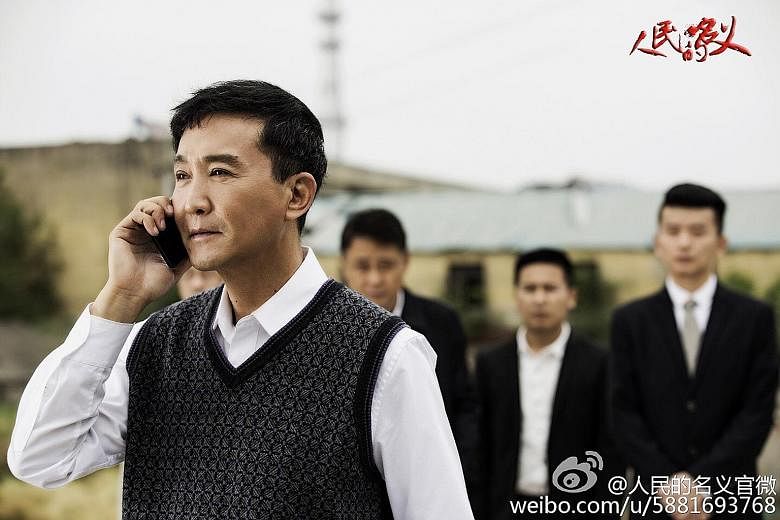BEIJING • In the midst of China's Cultural Revolution, a 14-year-old coal miner bought a yellowing, torn copy of Honore de Balzac's biography from a book collector on the side of the street.
He became engrossed in the text and dreamt from then on that he would devote his life to literature - to become, as Balzac was, a "secretary transcribing history".
Today, Zhou Meisen is a celebrated 61-year-old novelist and screenwriter who has captivated Chinese audiences with In The Name Of The People, the first television drama showing high-level government corruption to air in the country in more than a decade.
The drama, which completed its 55-episode run late last month, has been a pop cultural sensation, garnering nearly three billion views across China's biggest online video platforms.
It was even mandatory viewing at some government offices, the local media reported, as some Communist Party cadres were required to submit 1,500-word reviews describing their experience watching the programme.
Based on Zhou's novel of the same name, the show was produced with 120 million yuan (S$24.3 million) from China's top investigative and prosecutorial agency and aimed to portray the inner workings of President Xi Jinping's wide-reaching anti-graft campaign.
The crackdown, launched after Mr Xi took office in 2013, has been touted for targeting both high-level "tigers" and low-ranking "flies", though critics have called the initiative a political purge.
The endemic corruption and lavish wealth among members of China's ruling party have long been a taboo subject. Zhou avoided interviews with the foreign press during the drama's run because he feared any "misunderstanding" could cause the show to be taken off air.
"For the past 20 years, I have been recording the dramatic changes in Chinese society," he said. "Like the French society that Balzac portrayed, we are seeing the emergence of a new bourgeoisie."
In the show's first couple of episodes, a star anti-corruption investigator finds more than 200 million yuan in cash in a local official's secret mansion.
The bills are everywhere - spread across a bed, stacked against a wall, even piled inside a refrigerator.
When the official sobs to the investigator that he comes from a family of farmers and "didn't dare spend a cent", the investigator counters: "Pity the nation's farmers, to have a son like you."
The scene, which many viewers cite for getting them hooked on the drama, reflects an irony of China's upper class: With their newfound wealth, the corrupt end up exploiting the blue-collar workers they once counted themselves among.
"My childhood was chaotic," Zhou said. "We lived in such poverty. We relied on government stamps for everything, everything but air."
The opening episode is based on the real-life case of Wei Pengyuan, a deputy director of the national coal department, who stored 200 million yuan in several apartments.
"This case surpassed my imagination," Zhou said. "I thought putting this case at the start would let my audience know: 'This author does not tell lies.'"
He had plenty of other material to draw from. According to a January report from China's Central Commission for Discipline Inspection, more than one million people have been punished as part of the antigraft campaign.
In writing his novel, Zhou said, all his research came from public records and media reports. But for the show, the Supreme People's Procuratorate permitted him to interview prisoners and tour police stations.
He said: "The only mandate they gave me was to create a show about the anti-corruption campaign. They said to me, 'Right now, we don't have a single show about fighting graft.' Other than that, they didn't interfere."
Still, he was surprised when all 55 episodes were approved for broadcast.
"For a long time, people thought there wouldn't be any corruption if we kept our eyes closed," he said.
Viewers have found the drama more nuanced than most of the government propaganda surrounding the crackdown on graft, which has ranged from teary "confessions" on primetime news shows to an eightpart documentary series featuring disgraced officials detailing their excesses.
As Mr Xi strives to consolidate power ahead of a key Communist Party congress later this year, several more corruption-themed shows are in the pipeline.
And Zhou will continue "recording modern Chinese history" as he sees it.
Quoting Balzac, he said: "What (Napoleon) has not completed with the sword, I will complete with a pen."
AGENCE FRANCE-PRESSE


